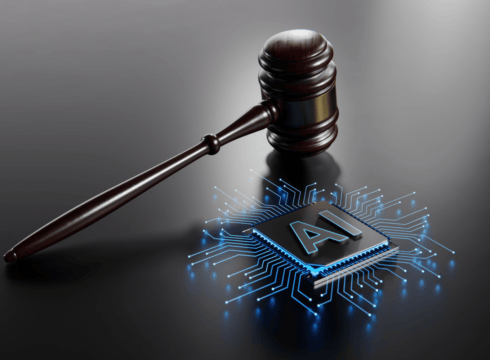The advancements in artificial intelligence makes traffic monitoring and enforcement much easier
AI can be of significant help in the minimisation of the time taken to respond to an accident and also in the investigation of the same
Through AI- supported interfaces and chatbots, people will be able to find legal information and assistance
Inc42 Daily Brief
Stay Ahead With Daily News & Analysis on India’s Tech & Startup Economy
Over the years, Indian roads have been flooded with numerous legal complexities ranging from traffic offences, accidents, detainment of vehicles and other on-road legal cases. All these problems not only threaten the lives of people but also create massive financial costs to the society and the affected parties.
However, integration of artificial intelligence provides a beacon of hope in effectively tackling these persistent issues.
Automating Traffic Enforcement
Violations of traffic laws is one of the most pertinent on-road legal concerns in India. The advancements in artificial intelligence makes traffic monitoring and enforcement much easier. This is done by employing camera systems to capture traffic violators that include speeding, running red lights or parking at prohibited areas.
These include such features as the electronic challans or tickets that are distributed directly to the violators’ mobile phones, which enhance compliance and reduce the need for enforcement by police.
Furthermore, using artificial intelligence, cameras can assess specific zones and monitor repeated infringement occurrences, guiding better the resources’ distribution and utilisation to prevent such events.
This is not only helpful for preventing road accidents but also useful for the development of a fair and transparent legal framework.
Streamlining Accident Response And Investigation
In any case, when an accident does happen, AI can be of significant help in the minimisation of the time taken to respond to an accident and also in the investigation of the same.
Employing the principles of big data, artificial intelligence systems can quickly determine the primary causes behind the accident with reference to sensor data, video records and witnesses’ statements. It is used in the identification of causation, policy-making and can generally be regarded as instrumental in the promotion of road safety.
Moreover, through the use of the reconstructed accident models with the help of artificial intelligence, it is possible to get more perceived information about the sequence of incidents of the accident. This can go a long way in cutting the time, effort and money needed in legal cases to perhaps gain a more swift and proper justice delivery.
Bridging The Gap Between Consumers And Legal Professionals
In terms of legal issues that consumers face in operating an automobile on a road in India, a major concern is the intermediate link between the consumer and lawyers. The problem lies in the fact that a number of people fear going to a lawyer for help because the term ‘lawyer’ has a negative connotation and hardly anyone knows how much they can charge.
This gap can be filled by AI- supported interfaces and chatbots, through which people will be able to find legal information and assistance.
The role of AI in imparting information as to consumers’ rights and obligations, as well as the procedures relating to accidents that occur on the road is to increase consumers’ awareness of the legal procedures in a bid to enhance the general public’s understanding on the operations of the legal systems.
Furthermore, AI powered tools of legal research and analysis will help the legal personnel to have the working knowledge of the legal regime, the precedents and the legal cases relating to the on-road legal issues.e complex web of regulations, precedents and case law relevant to on-road legal matters.
Addressing The Affordability Challenge
Expense is another daunting factor that comes in the way of addressing the on-road legal concerns since the matters are very expensive to settle. Because there is no fixed tariff for the charges that lawyers may make for work done, clients are often confronted with large disparities in the cost of services even for similar problems.
AI could solve this issue through promoting the more appropriate approaches to the pricing of work that is provided by the platform, to make certain that all the necessary support for people in need of Legal advice is provided at a considerably cheap price.
Some of the general benefits of using AI in legal services include cost savings resulting from reduction in repetitive work, increased efficiency of workflow when it comes to paperwork and consumer relations. This results in a fair legal system for all where people who have been wronged or wish to protect their rights on the road or anywhere else get a chance at justice.
Conclusion
The use of AI in handling the legal issues involving on-road opens the door to development for India. With the help of AI, traffic offences can be automatically enforced, the processes of accident response and investigation can be facilitated, the connection between consumers and legal practitioners can be established and the issue of affordability can be addressed, which can essentially change the approach and handling of legal issues on the roads.
By opening ourselves to this technological advancement, the public and developers must ensure that such advancement does not come accompanied by ethical dilemmas, compromising of data privacy and safety, as well as lack of appropriate and noble development and implementation of AI systems. Through the right balance between the development of new innovative solutions and the necessary compliance, it is possible to guarantee the full potential of artificial intelligence in solving on-road legal issues and creating safe, efficient and fair transport for all.
Key Highlights
Funding Highlights
Investment Highlights
Acquisition Highlights
Financial Highlights
Note: We at Inc42 take our ethics very seriously. More information about it can be found here.






